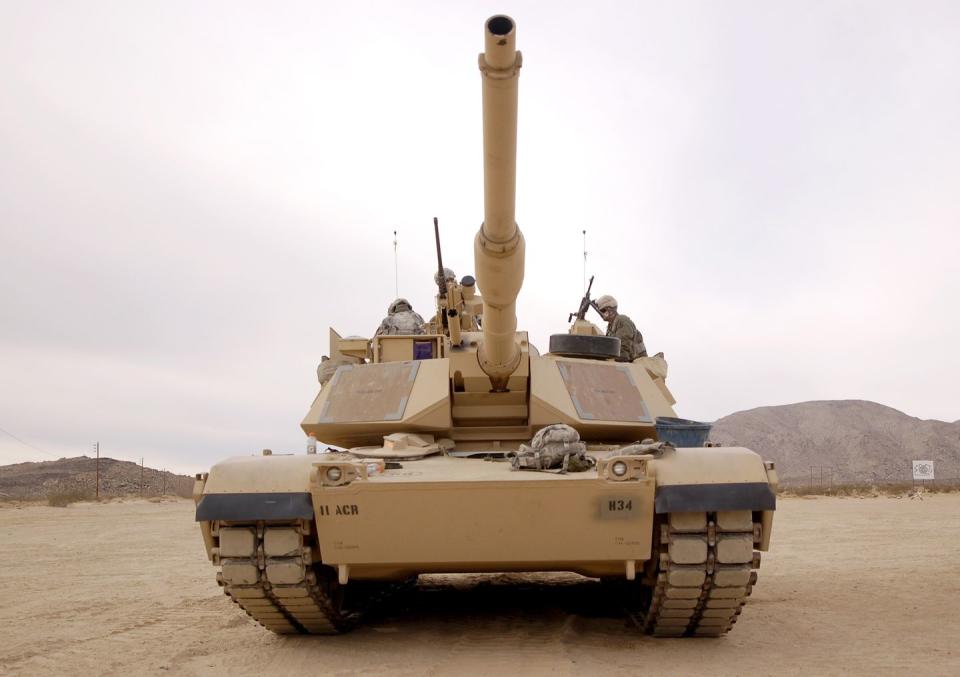NSA to Pentagon: Lock Down Your Weapons Before Hackers Get to Them
"Hearst Magazines and Yahoo may earn commission or revenue on some items through the links below."
The National Security Agency (NSA) is concerned that hackers could gain access to the computers inside American weapons systems.
Almost all U.S. weapons are equipped with computers, and many tie into classified networks to distribute data.
The concern is that a high-tech adversary could hack into weapons and render them inoperative—or worse.
Hackers could gain access to the U.S. military's most complex weapons systems. That's a warning straight from the National Security Agency (NSA).
As the military begins to confront high-tech adversaries like China and Russia, weapons that run on computers are at risk of being compromised, the agency says. It's hard to get around that reality at present; In a world where the Pentagon wants advanced weapons that can wirelessly transfer data to one another, nearly all of them rely on computers, networks, and data links that hackers could exploit.
✈︎ Don't miss our best-in-class military news. Join our squadron.
Most Americans know the NSA as the country's leading intelligence agency, responsible for collecting foreign intelligence via computer, cell phone, and other electronic means. But the NSA is also responsible for cybersecurity and playing defense against other countries that seek to penetrate American computers and computer networks.
Now, as the U.S. pivots away from two decades of warfare against guerrillas and terrorists, the NSA is warning that America's weapons are vulnerable to attack. Technologically savvy adversaries could compromise weapons with computers—known to the NSA as National Security Systems—impairing the ability of U.S. forces to fight.
As a result, the Pentagon must harden National Security Systems against outside threats, particularly cyberattacks. And weapons systems don't just include hypersonic missiles or lasers. "In terms of weapons systems, we have computers on wings, at sea, and on land. We don't think of [weapons systems] that way, but none of them work without computers," Rob Joyce—head of the NSA's Cybersecurity Directorate—said during an industry event last week, according to a Breaking Defense report.
Russia and China, and to a lesser extent, North Korea and Iran, have trained cyber personnel whose sole mission in wartime (or even in peacetime) would be to gain entry into American computer and networking systems. Even a relatively minor, unsecured weapon could allow hackers access to a larger system.

Almost all American weapons, with the exception of small arms and crew-served weapons (like machine guns), include built-in computer systems. The computers add functionality, including fire control (correcting and adjusting aim against distant or fast-moving targets), navigation (receiving GPS signals), and communications (voice and data transmission). These computers often tie into large, sometimes globe-spanning networks to issue orders, collect data, report enemy sightings, and even coordinate attack or defense among geographically disparate forces.
What might one of these cyberattacks look like? In the 2015 technothriller Ghost Fleet, the U.S. military simultaneously goes to war with Russia and China. The war includes a surprise attack on Hawaii, including an all-out hacking effort to disable America's most powerful weapons. Warships, F-35 fighters, and other systems are knocked out of the fight without firing a single shot—or having a shot fired at them.
In real life, the most concerning hacks could look similar: the Pentagon is most worried about attacks that would compromise weapons, causing the software that runs them to crash. That could sideline a fighter jet, or the radar that protects a carrier battle group, or cause a satellite to go offline. More subtle hacking activity could include penetrating communications networks, sabotaging databases (deleting spare engines for fighter jets from a spare-parts roster), and locking legitimate users out of crucial networks.
The NSA wants the military-industrial complex to take cyber vulnerabilities seriously. Unlike the kinetic battlefield—where aircraft and armored fighting vehicles spend most of their time out of contact with the enemy—the wireless nature of computer networks means that those same weapons will be under constant threat of enemy assault. That requires a different kind of armor, armor that could be just as important as the kind that stops bullets and shells.
🎥 Now Watch This:
You Might Also Like

